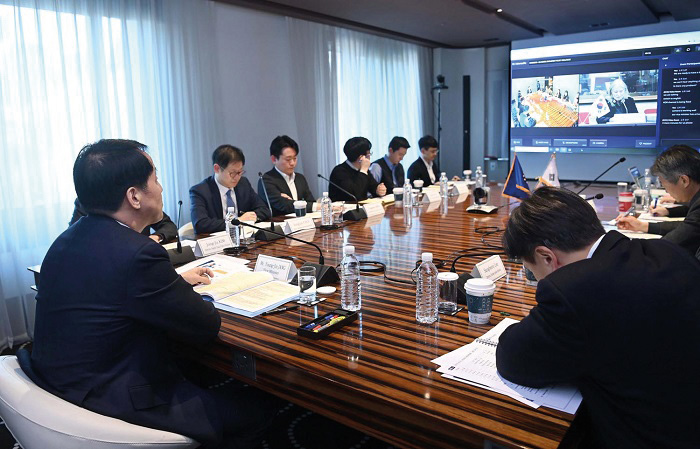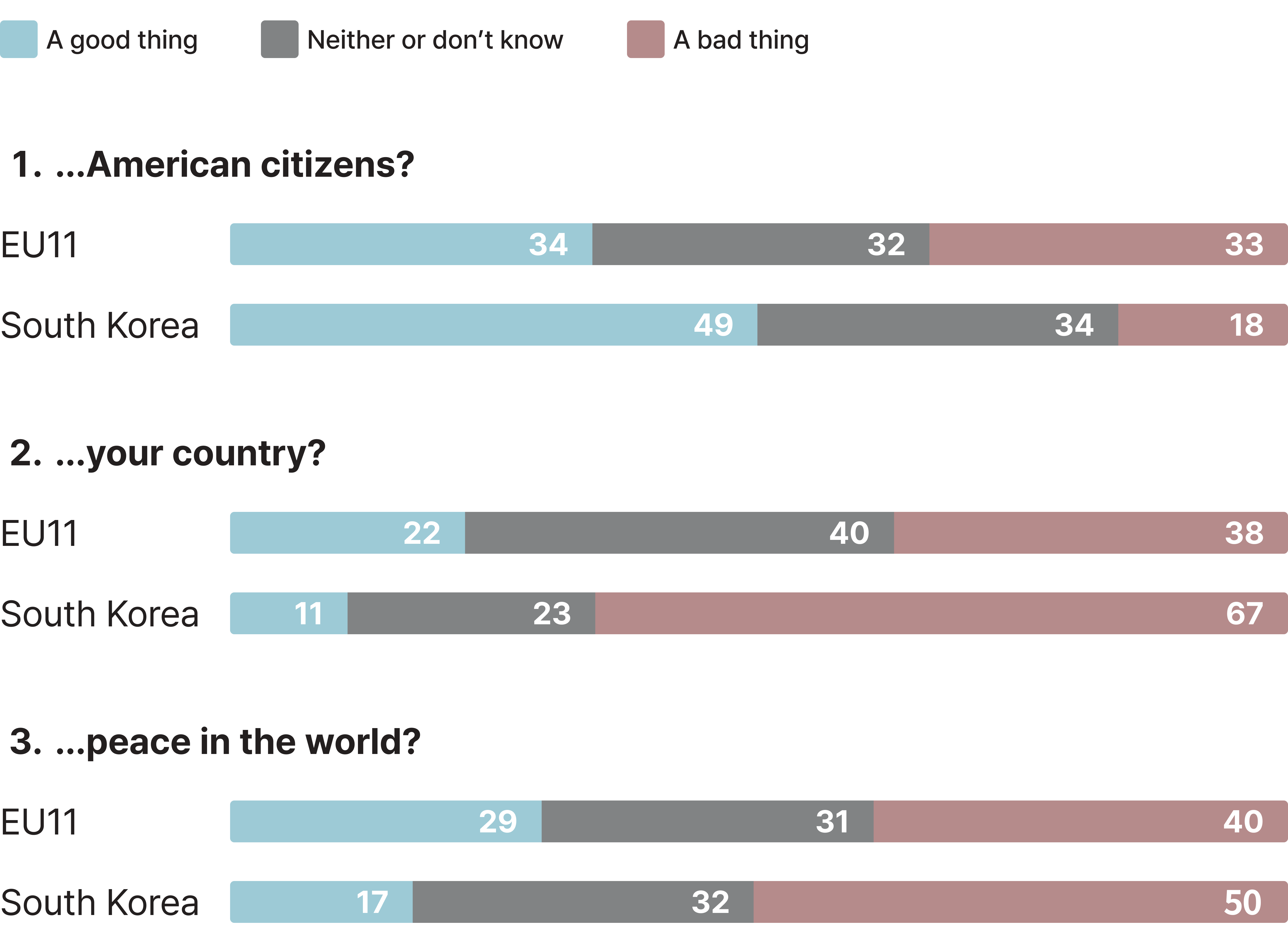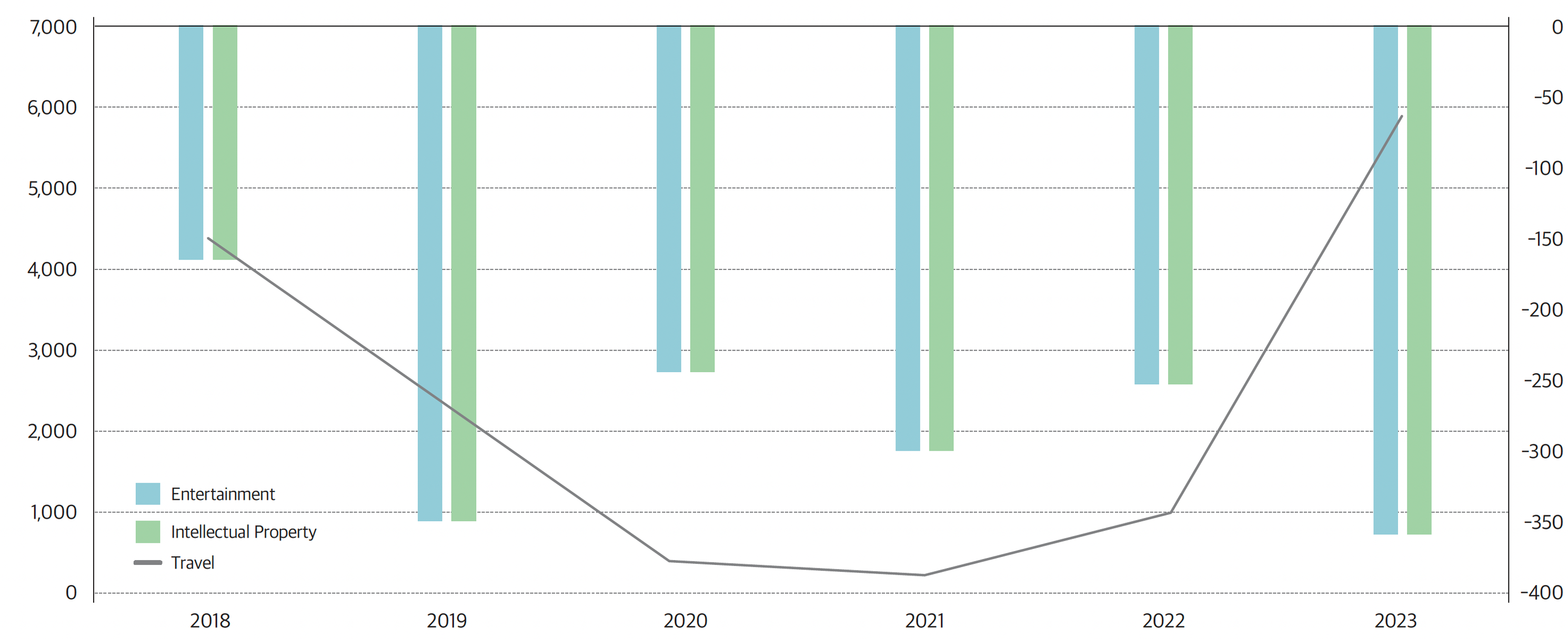The Korean Economy: Turning Crisis into Opportunity
Global Experts Analyze
Korea’s Economic Partnerships
With South Korea’s new administration launching on June 4, attention is turning to strategies for global economic cooperation. Experts from major global powers—including the U.S., EU, and Japan—offer diplomatic insights and partnership proposals to help Korea chart its path forward.
Anthony Kim, Senior Research Fellow, The Heritage Foundation (U.S.)
The Significance of the Korea-U.S. Alliance
Forging greater pragmatic cooperation between willing allies necessitates timely, forward-looking strategic clarity in terms of paving an elevated trajectory of the alliance. That’s the key task confronting Seoul and Washington at this critical geoeconomic hinge point.
From a broader geopolitical foreign policy perspective, the U.S.-South Korea bilateral relationship, anchored in the 1953 Mutual Defense Treaty, is one of the strongest and most successful built by America since the end of World War II. Once a recipient of U.S. development assistance, South Korea has become one of the most competitive economies in the world, and notably transformed itself from a security consumer to America’s capable and reliable partner of providing security to other nations.
Not ambiguously, the United States and South Korea share a relationship that is truly unique among our closest friends and allies.
Americans and South Koreans have never been adversaries. Working side by side to deal with common challenges has indeed forged a lasting, vibrant relationship between the two long-time allies that support each other, defend each other, and depend on each other.
Clearly, the U.S.-South Korean alliance has been fulfilling its promises. Yet, more can and should be done, given the fact that there are untapped, innovative ways in which to broaden the work going forward together.
To that end, weeks and months ahead deserve to be a pragmatic transition in South Korea-U.S. relations from that of a purely military and economic alliance to a more far-ranging partnership, particularly elevated by greater strategic clarity and cooperative commercial diplomacy initiatives that will enhance the resilience and practicality of the alliance. Seizing that opportunity would be a fulfilling way to gain from an ever-evolving partnership on key strategic fronts to move the U.S.-South Korea alliance forward and onward together.
Korea-U.S. Economic Security Partnership in a Changing Global Landscape
Economic security has emerged as a defining issue of the era of Trump, necessitating more holistic, synchronized endeavors and actions across government agencies, businesses, and civil society. To be sure, there will always be some level of trepidation about how to deal with Trump. However, overreaction is something for policymakers in Seoul and anywhere else to avoid. South Korea , in particular, needs to be more strategically flexible, particularly in terms of securing lasting, long-term practical gains and solidifying the partnerships with the United States.
Fortunately, South Korea has a number of key assets and technological capabilities that the United States needs at this critical geoeconomic juncture. That unique advantage can and will provide constructive and practical incentives to make Trump’s explicit emphasis on “reciprocity” better and more strategically applicable to the ever-evolving multifunctional South Korea-U.S. alliance in a broader context of burden sharing.
South Korea is one of the best examples of an ally putting its alliance with the United States in action as America’s capable and reliable partner that can play a pivotal role in a broader context beyond the U.S.-South Korea security theater. This unique alliance has been buttressed by a track record of supporting mutual interests across the Pacific while overcoming challenges and adapting to ever-changing global economic and security environments.
South Korea and the United States have prospered from vibrant trade and investment engagements. Looking ahead, the bilateral relationship is likely to be influenced and shaped by circumstances related to Washington’s orientation, changing economic order, supply chain, and technology. The key question is how we collectively adapt and recalibrate the cooperative efforts of the South Korea-U.S. pragmatic economic partnership to expand cooperation in both the public and the private domain.
In that context, perhaps more essentially, Seoul should formulate a more proactive operational approach of “joint investor and co-developer” when South Korea deals with the second Trump administration, not just through the “exporter-importer” trading relationship framework. For example, pursuing a bilateral strategic defense and energy industry ecosystem can and will strengthen economic security partnerships between the two like-minded and willing partners, particularly facilitated by South Korean’s highly capable private sector that can be a force multiplier for the new administration in South Korea.
Toward an Unwavering Korea-U.S. Partnership
Despite too much noise and too many distractions, South Korea and the United States have been able to preserve a critical alliance—economically and strategically indispensable partnerships. Indeed, there are tactical opportunities for the two long-time allies to work together more practically. For more than seven decades, the U.S.-ROK alliance has played an indispensable role in promoting peace, economic prosperity, and security in the Indo–Pacific region and beyond. South Korea’s relationship with the United States has been long institutionalized, buttressed by shared values, people-to-people ties, and cutting-edge business cooperation, perhaps far stronger than skeptics may argue.
There has never been a better time for Korea and the U.S. to seize the opportunity to act globally together.
At the state dinner during his November 2017 trip to Seoul, President Trump unambiguously reaffirmed that “[a]s true partners, we have remained faithful friends through periods of challenge and opportunity. And that’s what we have now, is great opportunity. We will continue to support each other in the years ahead.” Indeed, the Republic of Korea and the United States have been faithful partners navigating through periods of ups and downs.
Indeed, now is the time for Seoul and Washington to build on that steadfastness and further advance the time-tested alliance to a wider and higher horizon.
Françoise Nicolas, Senior Advisor, Center for Asian Studies, French Institute of International Relations (IFRI)
The Republic of Korea (hereafter RoK or Korea) and the European Union (hereafter EU) have been close partners for a long time. As recalled by a Korean ambassador a couple of years ago the RoK and the EU are “born to be the best like-minded partners, united by the common values and principles of democracy, market economy and the rule of law, as well as a shared commitment to global peace and prosperity.”
A deepening partnership
The two partners established the official Korea-EU Framework Agreement as early as 1963. Since then, the partnership has grown, with the revision of the framework agreement, the signing of the Korea-EU Free Trade Agreement (FTA), and the upgrading of bilateral relations to a strategic partnership.
The last decade has been marked by an array of challenges to the EU and South Korea both as individual actors but also as partners, including the increasingly contentious relationship between the world’s two largest economies, the US and China. Over the years, the Korea-EU relationship has been characterized by converging views on a multiplicity of issues, leading to deeper cooperation in the form of various partnerships.
The first such partnership is the EU-Korea Digital Partnership that was launched in 2022. It complements the 2010 bilateral FTA with modern and binding rules on digital trade, including trade facilitation, trusted data flows and data innovation, digital trust, standards, digital skills for workers, bans on requirements for local data retention and the digital transformation of businesses and public services. These rules aim to increase transparency and predictability for businesses, promote a secure on-line environment for consumers and counteract digital trade barriers. Following this launch the two partners hold every year a Digital Partnership Council with a view to advancing cooperation for an inclusive and resilient digital transformation.
The EU and Korea have also established a Green Partnership in 2023, the objective of which is to strengthen bilateral cooperation and encourage exchanges of best practices on climate action, clean and fair energy transition, protection of the environment, and other fields of the green transition.
Finally, in November 2024, Korea and the EU announced a Security and Defense partnership that will usher in a new era of cooperation on shared security concerns.
EU’s concern with economic security and the role of Korea
Economic security has emerged over the past few years as a major concern for the EU. Its economic security strategy aims at ensuring resilient and diversified value chains and essentially at “derisking”, in other words at reducing the vulnerabilities resulting from excessive dependencies. To that end, the EU relies on a three-pronged strategy (the three Ps): protect, promote and partner.
In this context, Korea is undoubtedly a partner of choice for the EU. The EU and Korea held their first bilateral Supply Chains and Industrial Policy Dialogue to address matters of economic security, supply chain resilience, and industrial decarbonization. They agreed to strengthen cooperation on early warning systems to detect and address potential supply chain disruptions in key industries both through bilateral and multilateral cooperation.
But the two partners could go further and seek to more systematically share information in normal times, expand sources for the procurement of important goods and items, as well as allow for flexible procurement during crises. To that end, an option may be to set up a Trade and Technology Council (TTC) between the EU and Korea, similar to the EU-US or EU-India TTC.
Also, in order to enhance their respective economic security, the EU and Korea could engage in joint or coordinated actions to counter coercive economic practices.
Korean firms’ advance in semi-conductors but also their focus on 6G, artificial intelligence (AI) or robotics offer ample opportunities for cooperation with the EU and its individual member states in their endeavor to enhance economic security.
Given the leading position of Korean firms in sectors such as electric batteries and green shipping, Korea is likely to benefit from the implementation of the EU’s Critical Raw Materials Act and the Batteries Regulation, which aim among other things at limiting dependence on critical minerals and reducing carbon emissions.
 The 1st Korea–EU Supply Chain & Industrial Policy Dialogue held in December 2023 (©Ministry of Trade, Industry and Energy)
The 1st Korea–EU Supply Chain & Industrial Policy Dialogue held in December 2023 (©Ministry of Trade, Industry and Energy)
The way forward
A recent poll conducted by the European Council on Foreign Relations (ECFR)1 has shown that both Europeans and Koreans are aligned on key issues, such as the rising economic risks associated with the Trump administration’s nationalistic trade agenda, the security concerns due to Russia’s war of aggression in Ukraine, or the growing competition from heavily subsidized Chinese producers and other Chinese unfair trade practices. In the current geopolitical environment, there is even more ample room than before for intensifying cooperation between the EU and South Korea.
To deepen the Korea-EU bilateral cooperation, there is no need to set up new mechanisms. While the groundwork is in place, however, it is now time for the two partners to walk the talk and turn their commitments into concrete actions that would benefit both.
Engaging with the EU is without a doubt in the interest of Korea and it should be pursued irrespective of who sits in the Blue House.
Beyond bilateral cooperation, Korea can and should also seek to contribute to uphold some EU’s initiatives, such as its Indo-Pacific strategy, the objective of which dovetails quite nicely with the Korean strategy.
Moreover, Korea should envisage cooperating with the EU as a group as well as with individual member states. Such a multilayered form of cooperation is particularly relevant with regards to security issues.
Lastly, Korea and the EU should seek to capitalize on their long history of support to multilateral settings such as the WTO to join their efforts on the international stage, in multilateral and plurilateral fora and push topics such as digital trade, the green transition or supply-chain resilience at this level as well.
- 1.https://ecfr.eu/article/polls-peril-and-partnership-why-south-korea-and-the-eu-are-natural-allies/
Do you think the election of Donald Trump as US president is a good or a bad or a bad things for... (Unit: %)
 Source: European Council on Foreign Relations (ECFR), November 2024.
Source: European Council on Foreign Relations (ECFR), November 2024.
Yukiko Fukagawa, Professor at Waseda University
In the second inaugural address in January 2025, President Donald Trump called for a “revolution of common sense”, started with the trade policy, intensively by tariffs. The global economy, intricately connected through supply chain networks, has been bombarded with unprecedented uncertainties. As significant suppliers of industrial goods, Japan and Korea are confronted with the challenges posed by this revolution, including the need to derisk the markets in China and the United States, to protect technologies for economic security, and to compete with China further on a global scale.
Enhancing economic security: Supply Chain Resilience and Technological Defense
In the short term, Japan and Korea as each ally to the U.S., are attempting to navigate the challenges by increasing investment into the U.S. market. However, skepticism persists regarding the feasibility of operations due to unrealistically high costs and uncertainties despite the substantial market size. This may create an room to cooperate within the U.S. territory. Korea’s investment in the localization of advanced chips may present opportunities for Japanese suppliers of parts, materials, and equipment. Japan’s electric vehicle (EV) manufacturing will be supported by Korean battery suppliers also.
At the same time, supply chain resilience necessitates Japan-Korea partnerships to effectively diversify the allocation of critical minerals, permanent magnets, and antibacterial substances for pharmaceuticals etc. While partnership exists already in major energy sectors, such as liquefied natural gas (LNG), seeking price leverage, diversifying resource allocation is motivated by economic security. Korea has developed a database for supply chain hazards, known as the Early Warning System (EWS), which has been subsequently adopted by Japan in its own initiatives. The exchange of information based on each EWS has started deliberately to enhance not only security but also foster trust between Japan and Korea.
As a divided state, Korea has undertaken preparations for cyber and other forms of attacks targeting major infrastructure and critical technologies. Japan lagged in this area too, but significant efforts culminated in the establishment of the Economic Security Promotion Act in 2024, which aims to address comprehensively to industrial promotion, protection, and partnership. The introduction of a security clearance system now facilitates investigations into individuals authorized to access critical government-held information, including civilians. Practical information exchange between the private sectors of Japan and Korea in relation to third-party threats may yield benefits for the participating entities.
Tapping Growth Potential: Joint Research and Investment in Human Capital
After the catching-up period learning and adopting foreign technologies, now Korea has established itself as a Research and Development (R&D) leader in the world. However, China has supplanted Korea’s traditional position in mass production of high value-added goods. To regain its competitive edge, Korea must transit to a fast mover based on its R&D. This shift necessitates partnerships with advanced countries in basic research and market integrating efforts. Following the trilateral meeting at Camp David in 2023, the United States, Japan, and Korea reached several agreements: 1) cross-border exchange of resources, materials, machinery, and data, 2) good access to necessary equipment and talent; 3) the establishment of common procedures for accessing confidential information. Tri-lateral research initiatives will focus on hydrogen purification and storage, advanced catalyst materials for hydrogen carriers, and the aerosol effects of climate change. Now both Japan and Korea have announced promotion policies for artificial intelligence (AI) or quantum computers, but the efforts are constrained by market limitations, compared to China or the United States. Consequently, both nations are exploring better focused approaches, such as the intersection of robotics and AI etc. The commitments outlined in points 1) to 3) may be implemented bilaterally to foster collaboration in these areas.
Figure Service trade balance between Japan and Korea (Unit: Million Yen)

Integrating Markets: A Service-Led Approach for Mature Economies
Korea’s development has been predominantly driven by manufacturing exports, which appear to foster a sense of national pride and optimism regarding prospects. However, Korea has achieved notable success in the content industry, such as television dramas and popular music, extending the value chains with fashion, cosmetics, food or restaurants. In the realm of social networking services (SNS), Japan has become the biggest foreign market for Korean company. Korea has lamented historical trade deficit against Japan, but it is noteworthy that Japan has experienced a deficit in entertainment and intellectual property services as is shown in the figure.
In European integration, the service sector has played a pivotal role, and after the income convergence, Japan and Korea have seen similar trends. As neighbors, Japan and Korea are natural trading partners in the services sector, based on social and cultural proximity, as well as demographic structures. In both nations, the service sector is predominantly characterized by self-employed small businesses, particularly in Korea. Then, the impact of this sector on employment and society may surpass that of global manufacturing. This dynamic is crucial for both parties to survive in a turbulent global market. A high-level digital trade agreement aimed at bolstering digital industries while promoting various personal services appears to be more promising and pragmatic. After all, services industries are based on person-to-person transactions. It is important to recognize that, as evidenced by recent trends in the tourism market, services can effectively highlight the proximity of cultures and social values, thereby fostering mutual understanding. Considering the need to separate historical grievances, territorial disputes, and other contentious issues, service sector potentials should not be disregarded.